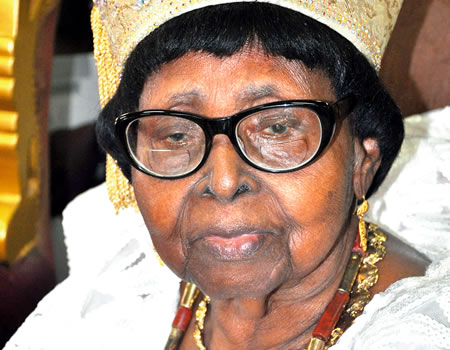ShORTLY after meeting Gowon, Lt. Colonel Murtala Mohammed, one of the plotters of the coup that made Gowon head of state, personally drove Awolowo to Ikenne. One of Awolowo’s most loyal political associates, BisiOnabanjo (later Governor of Ogun State in the Second Republic) accompanied him in the car. He arrived Ikenne to what a newspaper described as the “warm and hearty embrace” of HID. The Lion had come home to his jewel.
He was also warmly welcomed by two of his children and his grandchildren. Only Tola – who had since wedded KayodeOyediran in November 1963 – and Wole, were around. Ayo and Tokunbo were studying in England. There were also four grandchildren who had been born while he was in prison. Funke and Omotunde (Segun), Segun’s children were born in 1963, Oluwakemi and Yewande (Yemisi), TolaOyediran’s daughters, were born in 1964 and 1965, respectively.
“We had lots of hugs”, was how TolaOyediran described the reunion with their father. “He was filled with a lot of emotions and so was everybody. We were happy that, at last he got his freedom. It was a trying time for every Awolowo. I don’t even know how to describe it….. We kept touching him? Are you the real Papa? Talk to us now, we said to him”.
Hannah had held the fort with such fortitude, dignity and acclaim unsurpassed by any other wife of a political leader in Nigeria’s history. She took care of the children and the family, including surviving the death of his arole, a tragedy which could have broken the family; she stood up to the challenges of the political party that Awo left behind, and the alliance with the NCNC, including campaigning and even proving some funds for party activities, she managed the precarious relations between the party faithful while her husband was in jail; she dealt with, or responded well to, the jeering, provocations and/or attacks by her husband’s political adversaries; she kept his memory alive and held his honour high. Hannah made her husband’s homecoming restorative, rather than the depressing return it would have been given all that had happened.
Thousands of people congregated in Ikenne from far and wide to welcome Awolowo home. Many came to see the man who had achieved a mythic status, with narratives of Christ-like crucifixion and resurrection imposed on Awolowo’s journey. People were dancing and singing as he was driven into the small town of Ikenne. Old and new songs of Awolowo’s political life and trajectories were composed and rendered in, and even beyond, Ikenne.
Before, during and after his imprisonment, Awolowo’s political life and travails have been captured in popular culture, both by his supporters and detractors. According to Awolowo, on January 1, 1963, while he was undergoging trial for treasonable felony, Akintola and Fani-Kayode returned to Ibadan by a special plane. At the airport both were met by their supporters in the NCNC and Akintola’s new party, UPP. When they arrived at the Premier’s Lodge, there was drumming, singing and dancing, and Ayanlola, who had been a prominent performer at AG events before the crisis sang his new song to capture the ascendant order in the region.
Akintola ns’odunn’le;
Awolowo ‘nse tire l’ewon,
Akintola ns’odunn’le.
(Akintola celebrates the New Year at home;
Awolowo celebrates his in jail
Akintola celebrates the New Year at home)
Ayanlola was right. Indeed, while Akintola and his supporters were celebrating what they thought was their enduring victory over Awolowo on New Year’s day in 1963, Hannah was visiting her husband at the Broad Street Prisons same day. She had come to wish him a Happy New Year in the hope that he would be free soon. It was the first time she would wear dark glasses since they met in the early 1930s. It was also ObafemiAwolowo’s first New Year day in confinement. When she saw her husband, as she had done through the night that heralded the New Year, she wept.
“Why, why, why?” she sobbed. “Why are they so cruel?”
Awolowo’s supporters had their own songs. In 1964, while Awolowo was still in jail, Hubert Ogunde, the playwright and actor, staged a famous play, Yoruba Ro’nu (Yoruba, think!) which was a stinging critique of Akintola’s role in the incarceration of Awolowo and the crisis in the region. The Akintola government banned the play. Nigerian Tribune banner headline when this happened was: “OGUNDE IS OUTLAWED”, with a kicker: “It is dangerous to the good government of the West”. The paper reported that the NNDP government “has again stretched its hands of vindictiveness to other fields other than politics”, by outlawing “a concert party led by a great Nigerian” playwright and dramatist, Ogunde was scheduled to stage “Yoruba Ro’nu” that day, April 1, 1964, in Ibadan, but was prevented from doing so.
But the play was followed by a song by the same title, a poignant reflection of what the playwright rendered as the horrible fate of the Yoruba due to the actions of specific political leaders in Yorubaland who were collaborating with “outsiders”. In the song, Ogunde deploys metaphor, innuendo, metonym, and alliterations which all add up not only to a scorching appraisal of the political situation in the Yoruba West, but also a call to arms. He sang about the Yoruba who “undermine one another in pursuit of position”, and those who “declare the innocent guilty and the guilty innocent”. In what turned out to be a prediction of Awolowo’s eventual victory, Ogunde sang that “Oriki ma i burutiti, kobuogunodun/Leyinokunkunbiribiri, Imole a tan/EjekapeOlodu-mare, kapeObaluaye; k’ayewa le dun niigbehin, igbeinlalayota (But misfortune, I say, does not last for a lifetime/For after darkness comes light/So let us cry unto Edumare, the makers of heaven and earth to grant us recover/For he who laughs last, laughs best”.) In what was clearly a reference to Akintola, who was regarded as a traitor, Ogunde concluded in “Yoruba Ro’nu” that “Eniba dale, a baile lo” (Those who renege on oath will pay the price).
After the proscription of his play, Ogunde beseeched the people in another song to help ask the “agbaiya” (“useless elder) and “ika” (“the wicked’), that is Akintola, what he had done to deserve a ban. Describing Akintola and his allies as people who have “turned themselves into purchasable sheep” and “birds bloated by curses” the famed actor also taunted Akintola – a man who himself was versed in the nuances of the language – that he had turned into “jagunmon”, one who is unable to walk the street freely in daylight, while reminding him that “Ojoesanmboooo/Ku dedelawa (“We are at the threshold of retribution”). In capturing the popular imagination in Yorubaland that Akintola was kowtowing to the Hausa-Fulani, Ogune sang that “Sugbonnit’awaomoOduduwa/Kaka dobale fun keferi/Karojukaku” (“But for the descendants of Oduduwa/Rather than prostrate to the infidel/We will rather die”)……..
Against the backdrop of Ogunde’s songs which fully reflected popular sentiments in Yorubaland, Awolowo’s triumphant return – without having to “prostrate to the infidel” and without reconciling with the “jagunmon…. Bloated by curses”, – was a cause for much joy in the land. At any rate, it was not a surprise for Awolowo’s teeming supporters that by the time the man later described by HarunaIshola, the popular apala musician, as “Asoro bi ni’ja, Baba Layinka (“One who is risky to challenge to a fight”) returned, his leading adversaries had assassinated by the soldiers.
In all the songs in praise of Awolowo, he was generally represented as “the light” who was sure to be victorious over darkness. Therefore, when he returned to Ikenne, the Students’ Union of the University of Ife issued a statement saying that “We have long expected you back to dispel the darkness in which you left the country. We hope the victorious dawn has come or at least at hand”.
As he beamed his famous smile and waved the recognized victory sign, Awolowo, accompanied by his long-suffering wife, H.I.D, who owned the victory as much as her husband, made his way to St. Saviour’s Church, Ikenne for the thanksgiving service. At the service, Awolowo read the first lesson. In his speech later, he acknowledged his wife’s fortitude and thanked everyone who had come to welcome him. The Lisa of Ijeun said he was particularly grateful to the common people, the men and women who stood by him even when some whom he had assumed will be steadfast “failed”.
Awolowo also urged the people to “forget the past and…. face the future with confidence”. He recalled that the last time he was in Ikenne was July 22, 1962. The service was attended by the Akarigbo of Ijebu-Remo, Oba Moses Awolesi, AlhajiAdegbenro, Chief O.B. Akin-Olugbade, Chief Julius Odeku, Chief J.A.O Odebiyi, Alhaji G.O. Dawodu, Chief Toye Coker, and other leaders of the AG…
TO BE CONTINUED
EBINO TOPSY – 0805-500-1735 (SMS ONLY PLEASE)
WATCH TOP VIDEOS FROM NIGERIAN TRIBUNE TV
- Let’s Talk About SELF-AWARENESS
- Is Your Confidence Mistaken for Pride? Let’s talk about it
- Is Etiquette About Perfection…Or Just Not Being Rude?
- Top Psychologist Reveal 3 Signs You’re Struggling With Imposter Syndrome
- Do You Pick Up Work-Related Calls at Midnight or Never? Let’s Talk About Boundaries








